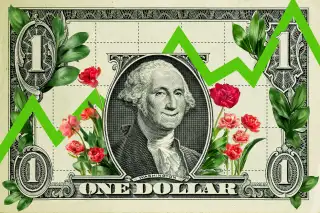We Might Not Get a Recession After All. What’s That Mean for the Stock Market?

The odds of a recession are changing quickly — and investors are taking note.
In a news conference on Wednesday announcing the Federal Reserve’s latest rate hike, Fed Chair Jerome Powell said that economists at the central bank are no longer anticipating a recession.
“The staff now has a noticeable slowdown in growth starting later this year in the forecast,” he said. “But given the resilience of the economy recently, they are no longer forecasting a recession.”
That economic resilience Powell pointed to comes from changes in the labor market and the pace of inflation. He noted that the cooling in the job market is coming from fewer job openings and more people joining the workforce — not from higher unemployment.
“We’ve seen the beginnings of disinflation without any real costs in the labor market,” Powell said. “And that’s a really good thing.”
Recession concerns and interest rate hikes have weighed on the stock market since early 2022. But improving sentiment around the economy could help boost prices moving forward.
Some market watchers share the positive sentiment, even amid lingering doubts that a tech-fueled rally earlier this summer wouldn't be broad enough to support the entire stock market.
Last week, data from the American Association of Individual Investors’ weekly survey showed that retail investors haven’t been this optimistic about the stock market in two years, with a little more than half of participants reporting that they believe stocks will rise over the next six months. That optimism faded slightly this week, with 45% of participants reporting bullish sentiment, but remains above average.
Wall Street analysts agree. Earlier this month, strategists from Credit Suisse raised their year-end target for the S&P 500 index from 4,050 points to 4,700 points — about 2% higher than its current level. According to a research note reviewed by Retuers, Credit Suisse’s experts cited declining recession risk and a stronger outlook for big tech earnings as the reason for their new bullish forecast.
In an interview with CNBC last week, Yardeni Research President Ed Yardeni said he’s targeting 4,600 points for the S&P 500 index at the end of the year. Beyond that, Yardeni said he’s anticipating the index to rise to between 4,800 and 5,400 points over the next year and a half.
"I think that's going to be because there is no recession, because earnings are going to be picking up, and I think because the market will in fact, broaden out," he added.
What's next for stocks?
No one has a crystal ball when it comes to the market, and stocks’ momentum will ultimately be determined by a variety of economic factors — especially interest rates, which the Fed will continue to adjust depending on the strength of the job market and the progress of inflation.
“Equity performance in the second half of the year will likely depend on monetary policy, despite recent near-term strength” Carl Ludwigson, managing director at Bel Air Investment Advisors said in email commentary shared with Money.
There are also other economic headwinds to consider: “Excess savings accumulated during Covid continue to dwindle,” EY chief economist Gregory Daco said in email commentary Thursday. "And the restart in student loan payments from September mean that outright declines in real consumers’ spending later this year are entirely plausible.”
Only time will tell how the market will respond.
Investors Haven’t Been This Optimistic About the Stock Market Since April 2021
The Stakes Are Especially High for the Stock Market This Earnings Season
‘Worst Time to Abandon the 60/40’: Why the Classic Investment Strategy Still Works